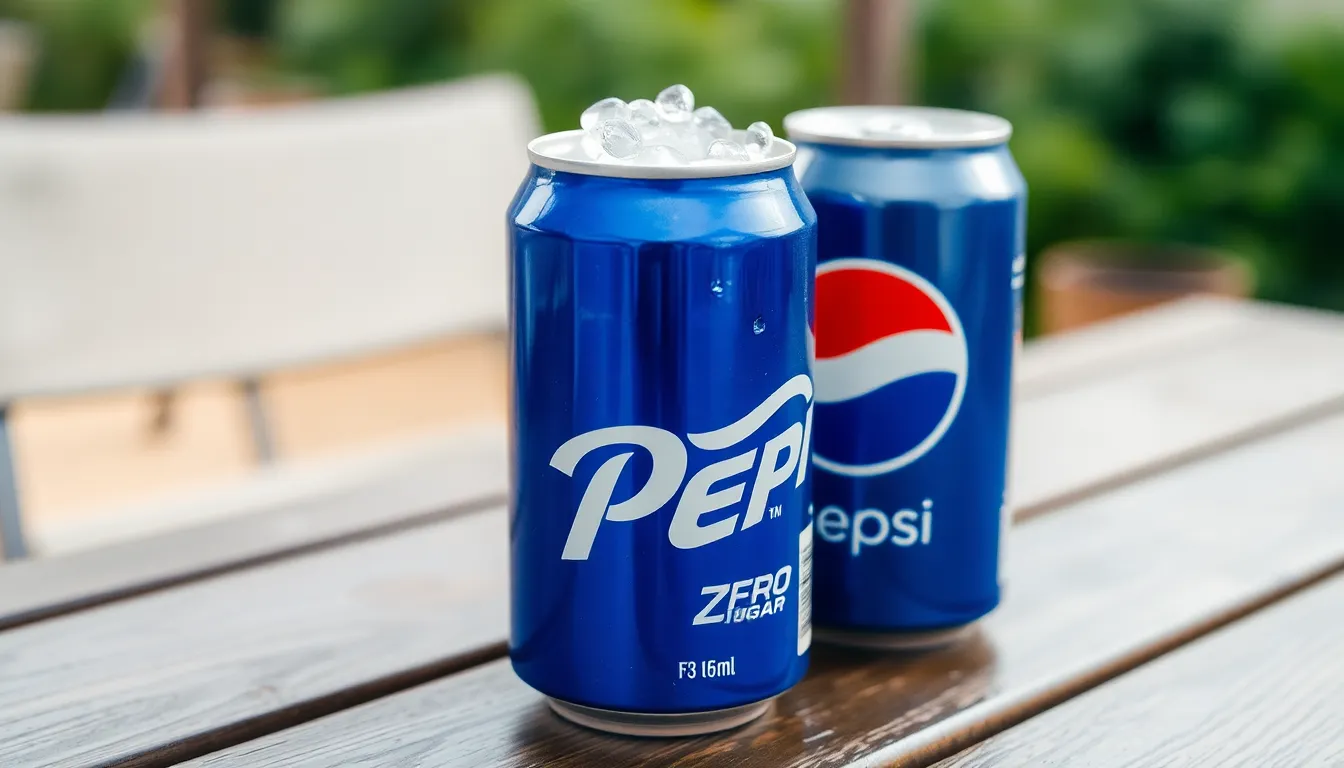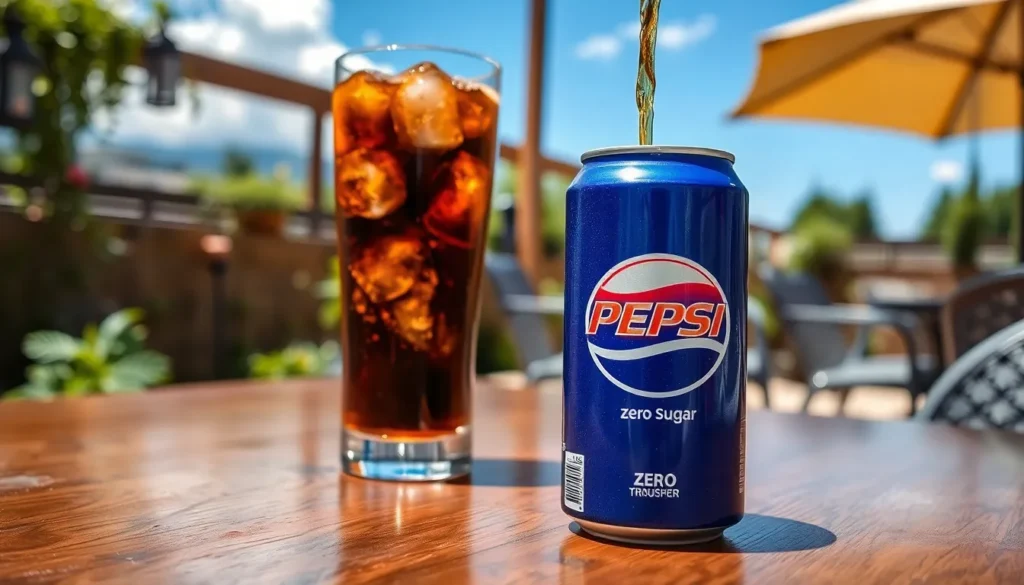Table of Contents
TogglePepsi Zero Sugar has become a go-to for those craving that classic cola taste without the extra calories. But before you crack open a can and dive into its fizzy goodness, there’s a burning question on many lips: does it pack a caffeine punch?
Overview of Pepsi Zero
Pepsi Zero Sugar offers a classic cola flavor without calories. This beverage appeals to consumers looking for a sugar-free option. Caffeine content in Pepsi Zero Sugar plays a significant role in its appeal to many fans. Each 12-ounce can contains approximately 69 milligrams of caffeine. Comparatively, this caffeine level is similar to regular Pepsi, which offers about 63 milligrams per same serving size.
Pepsi’s decision to include caffeine enhances the beverage’s taste profile. Many consumers enjoy the boost caffeine provides, especially during busy days. Additionally, the balance of flavor and caffeine makes Pepsi Zero Sugar a popular choice for both casual drinkers and those who prefer low-calorie diets.
Nutrition facts show that Pepsi Zero Sugar contains no sugar and no calories, making it an attractive alternative. Ingredients in this beverage include carbonated water, caramel color, aspartame, phosphoric acid, and caffeine. The absence of calories and sugar appeals to health-conscious individuals.
Caffeine content might affect those sensitive to stimulants. Regular consumption could influence sleep patterns or hydration. It’s essential for consumers to consider their overall caffeine intake when enjoying Pepsi Zero Sugar, especially in combination with other caffeinated products.
Taste and refreshment continue to drive interest in Pepsi Zero Sugar. Whether used as a mixer or enjoyed on its own, it consistently stands out in the beverage market.
Caffeine Content in Pepsi Zero

Pepsi Zero Sugar contains caffeine, providing an enjoyable boost for those who appreciate it. Each 12-ounce can delivers approximately 69 milligrams of caffeine.
Comparison with Regular Pepsi
Regular Pepsi contains about 63 milligrams of caffeine per 12-ounce serving. Though both beverages offer a similar caffeine experience, Pepsi Zero Sugar has a slight edge with its 69 milligrams. Fans of cola may prefer Pepsi Zero for its added caffeine punch while still enjoying a low-calorie option. Each beverage maintains a classic cola flavor, appealing to those who seek familiarity with a modern twist.
Comparison with Other Diet Sodas
Diet sodas vary in caffeine content. For instance, Diet Coke has around 46 milligrams per 12 ounces, while Coke Zero Sugar contains approximately 68 milligrams. Pepsi Zero Sugar stands out with its 69 milligrams, making it a competitive choice for those focused on caffeine. Many consumers look for diet options with caffeine for added energy, pushing Pepsi Zero to the forefront of beverage selection. Each alternative has unique flavor profiles, but Pepsi Zero maintains its distinct cola taste while keeping caffeine levels high.
Health Implications of Caffeine Consumption
Caffeine consumption carries various health implications that individuals should consider.
Benefits of Low-Caffeine Options
Low-caffeine options like Pepsi Zero Sugar can help maintain energy without excessive stimulant intake. They provide a refreshing taste while limiting potential side effects associated with high caffeine levels. Allowing for controlled caffeine consumption, these beverages may cater to those sensitive to stimulants or looking to reduce overall intake. Many consumers appreciate the balance between flavor and moderation. Lower caffeine levels also support hydration, making these drinks suitable for more frequent consumption.
Risks of Caffeine Intake
Excessive caffeine intake can lead to several health issues. Individuals may experience heightened anxiety, increased heart rate, or disrupted sleep patterns. Regularly consuming high-caffeine beverages can contribute to dependence, causing withdrawal symptoms like headaches and irritability if consumption decreases. Pregnant individuals should particularly monitor their caffeine consumption, as it may affect fetal development. Understanding personal tolerance levels plays a crucial role in preventing adverse effects. Therefore, moderation is key for those enjoying caffeine-rich drinks such as Pepsi Zero Sugar.
Consumer Preferences and Trends
Consumer preference trends show a significant shift toward low-calorie beverages like Pepsi Zero Sugar. Many individuals opt for alternatives that provide the taste of traditional cola without added calories. Caffeine content often plays a crucial role in their beverage choices; Pepsi Zero Sugar delivers approximately 69 milligrams of caffeine per 12-ounce can. This amount appeals to those seeking a moderate energy boost.
Health-conscious consumers gravitate toward options with no sugar and no calories, making Pepsi Zero Sugar an attractive choice. Awareness of caffeine levels also impacts purchasing decisions; some prefer beverages with higher caffeine, positioning Pepsi Zero Sugar competitively against rivals. Diet Coke has about 46 milligrams of caffeine, while Coke Zero Sugar contains around 68 milligrams. These comparisons help consumers understand their options clearly.
Popular trends indicate a desire for balance between enjoyment and health. Moderation in caffeine consumption remains essential, particularly for sensitive individuals. Some also appreciate the taste of Pepsi Zero Sugar as a mixer, which broadens its appeal in social settings. Their familiarity with traditional cola flavors continues to influence preferences, encouraging more consumers to try Pepsi Zero Sugar.
Emerging data on consumer behavior emphasizes the importance of personal tolerance levels in beverage choices. Staying informed about the effects of caffeine helps individuals make more suitable decisions. This awareness contributes to the growing popularity of low-calorie, caffeinated drinks, especially in busy lifestyles where energy boosts matter. Ultimately, choices reflect not only taste but health priorities as well.
Pepsi Zero Sugar stands out as a popular choice for those wanting a classic cola flavor without the calories. Its caffeine content of approximately 69 milligrams per 12-ounce can offers a satisfying boost for many consumers. This makes it a competitive option among other diet sodas, appealing to health-conscious individuals who still crave that fizzy refreshment.
As more people seek low-calorie beverages, understanding caffeine levels becomes essential. Moderation is key for those sensitive to caffeine, ensuring they can enjoy Pepsi Zero Sugar while maintaining a balanced lifestyle. Ultimately, this beverage continues to thrive in a market that values both taste and health.







